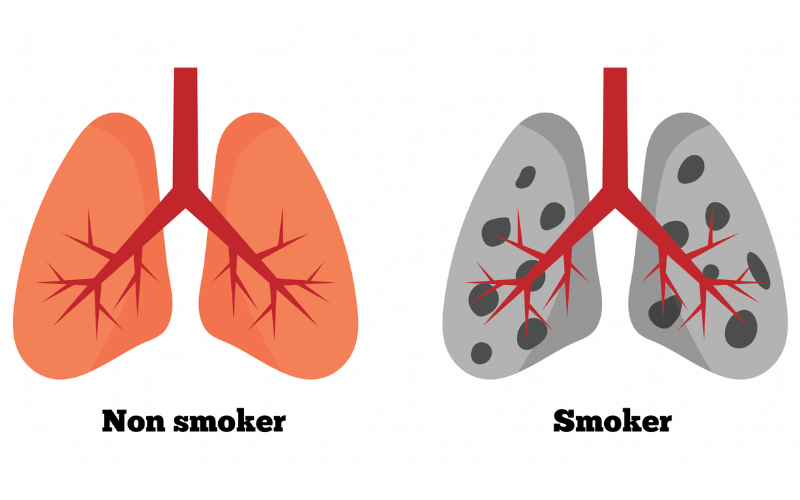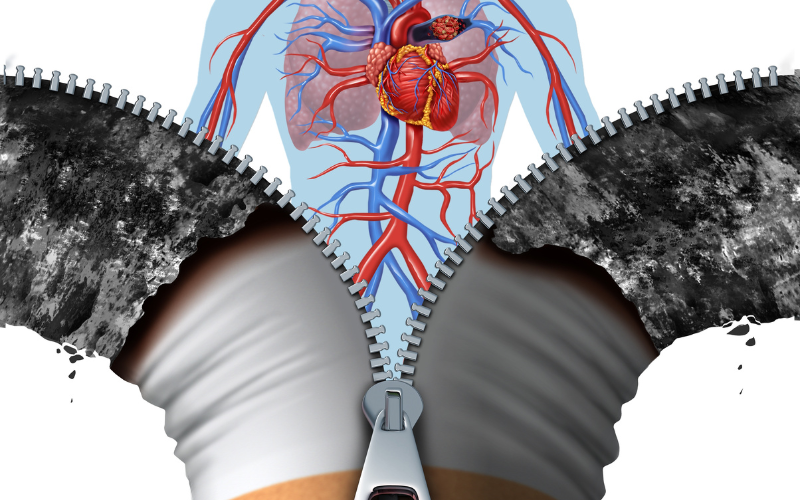Smoking, whether traditional cigarettes or vaping, continues to impact millions of lives, becoming a leading cause of preventable health issues. While quitting smoking is challenging, it is also deeply rewarding, offering long-lasting benefits to both physical and mental health.
This blog explores the harmful effects of smoking and vaping, the challenges of quitting, and how our Smoke Cessation Program provides a structured, supportive approach to help you achieve a smoke-free life.
The Impact of Smoking on Health
- Physical Health Consequences
- Lung Damage: Smoking damages the lungs by introducing harmful chemicals like tar and carbon monoxide, leading to chronic obstructive pulmonary disease (COPD) and lung cancer. Vaping, often marketed as a safer option, can cause lung irritation and severe respiratory illnesses like EVALI (e-cigarette or vaping product use-associated lung injury).
- Heart and Vascular Health: Smoking increases the risk of heart attacks, strokes, and arterial blockages due to elevated blood pressure and cholesterol levels. Vaping may also contribute to irregular heart rhythms and other cardiovascular conditions.
- Weakened Immune System: Smokers are more prone to infections such as pneumonia and respiratory tract illnesses. The chemical exposure weakens immune responses, making it harder for the body to fight diseases.

Mental Health Effects
Nicotine’s effects on the brain go beyond addiction, influencing emotions, stress responses, and overall mental health.
- Anxiety and Stress: While smoking may provide temporary relief from stress, nicotine withdrawal can exacerbate feelings of anxiety and irritability. This creates a vicious cycle of dependency.
- Depression: Chronic smoking disrupts brain chemistry, reducing levels of serotonin and dopamine—neurotransmitters essential for mood regulation. Vaping users often report similar depressive symptoms.
- Addiction Cycle: The brain becomes conditioned to seek nicotine as a coping mechanism, but over time, this reliance undermines emotional stability and cognitive function.
Challenges of Quitting Smoking
Quitting smoking is more than breaking a habit—it involves addressing nicotine addiction, behavioral patterns, and emotional triggers.
- Physical Challenges – Nicotine is a highly addictive substance, and withdrawal symptoms can include:
- Irritability and restlessness.
- Cravings for nicotine.
- Difficulty concentrating.
- Sleep disturbances and increased appetite.
These symptoms are temporary but can feel overwhelming without the right support.
- Emotional Triggers – Stress, boredom, or social settings often act as cues to smoke or vape. Recognizing and managing these triggers is key to staying smoke-free.
- Breaking Habits and Routines – For many, smoking or vaping becomes part of daily rituals—morning coffee, breaks at work, or social gatherings. Replacing these behaviors with healthier alternatives is essential for long-term success.

Our Comprehensive Smoke Cessation Program
Our Smoke Cessation Program is designed to address the unique challenges of quitting smoking and vaping. Using evidence-based methods and personalized care, we provide a holistic approach to help you succeed.
Key Features of Our Program
Brainsway Deep TMS Technology – We utilize Deep Transcranial Magnetic Stimulation (Deep TMS), a non-invasive treatment clinically proven to support smoking cessation.
- TMS targets the prefrontal cortex, a brain region linked to addiction and cravings.
- By stimulating this area, TMS reduces withdrawal symptoms, curbs cravings, and helps rewire neural pathways associated with nicotine dependency.
- TMS is FDA-approved for smoking cessation, offering a safe and effective solution for those struggling to quit.
Tailored Counseling and Behavioral Therapy – Quitting smoking is a personal journey, and our program includes one-on-one counseling to:
- Identify triggers and coping mechanisms.
- Develop a personalized quit plan.
- Address underlying emotional or psychological challenges.
Behavioral therapy further supports the transition to healthier habits by focusing on positive reinforcement and problem-solving techniques.
Ongoing Motivation and Accountability – Regular check-ins with our team ensure you stay on track. Progress monitoring helps you celebrate milestones, reinforcing your commitment to a smoke-free life.

Why Quit? The Benefits of a Smoke-Free Life
The benefits of quitting smoking begin almost immediately and continue to grow over time.
- 20 Minutes After Quitting: Blood pressure and heart rate drop to healthier levels.
- 12-24 Hours: Carbon monoxide levels in the blood return to normal, improving oxygen delivery throughout the body.
- 1 Month: Lung capacity begins to improve, reducing shortness of breath.
- 1 Year: The risk of heart disease drops by 50%.
- Long-Term: Risk of cancer, stroke, and chronic diseases significantly decreases, and life expectancy increases.
Beyond physical health, quitting smoking boosts mental clarity, emotional stability, and self-esteem.
Steps to Begin Your Smoke-Free Journey
- Set Your Quit Date
Choose a specific date to stop smoking and start mentally preparing yourself for the change. - Identify Triggers
Write down situations or feelings that prompt you to smoke or vape, and create strategies to address them. - Seek Support
Lean on friends, family, or a professional program for encouragement and guidance. - Replace Smoking Habits
Develop healthier routines, such as exercise, drinking water, or practicing relaxation techniques during moments of craving. - Consider Professional Help
Joining a structured program like ours provides the tools and support needed for a successful quit journey.
Conclusion: Reclaim Your Health Today
Breaking free from cigarettes and vapes is a transformative journey, one that restores health, energy, and confidence. Our Smoke Cessation Program provides the resources, care, and technology needed to make quitting possible.
Take the first step today by contacting us for more information. Together, we can help you or your loved one embrace a smoke-free future and the countless benefits that come with it.
Contact us now to learn more about our Smoke Cessation Program and start your journey to better health.








